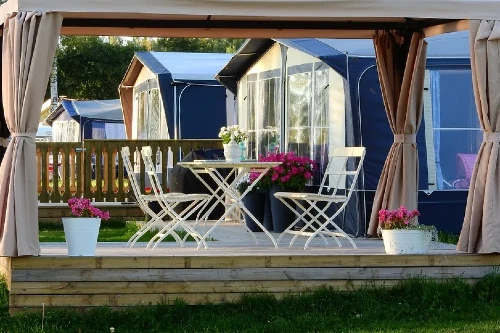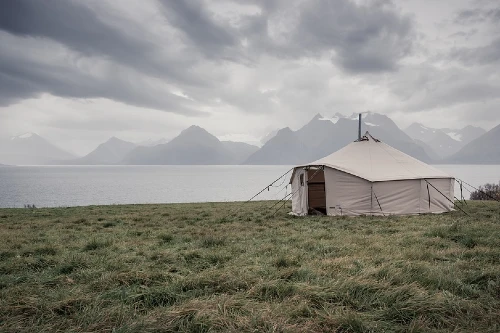To answer the question of whether you can sleep in a gazebo, you first need to ask yourself who would want to.
The word “gazebo” comes from the Italian word for canopy or bower and refers to an open pavilion with a roof supported by columns or posts.
In other words, it’s typically used as an outdoor living room that provides shelter from inclement weather.
In this sense, then, there is absolutely no reason why one couldn’t sleep in a gazebo–as long as they have a sleeping bag and/or mattress handy!
But what about camping? Would one be able to camp out in their backyard gazebo? We’ll explore this idea in greater depth below.
Can You Sleep in a Gazebo?

As long as you have a comfortable sleeping bag or mattress to put inside, then yes! You can sleep in a gazebo.
A gazebo is designed to give people an open-air space to read, eat, chat and enjoy the weather. Such structures usually have at least two walls with one or more openings so it’s important not to put anything valuable inside–especially if there are no locks on doorways or windows!
Gazebos can be used as seating during parties and other such events but they shouldn’t be considered an alternative to indoor living areas like bedrooms, dining rooms, and family rooms because they typically don’t have enough room to accommodate all of the necessary furniture.
For this reason, most people only use their gazebos during warmer months when they’re capable of spending time outdoors. Although, you can keep a gazebo all year-round and have some fun during winter.
In summary, a gazebo is a great addition to any backyard because it provides shelter from the elements and it can be an inviting space for people who love spending time outside.
Camping in a Gazebo?

Camping, in this sense, refers to spending one or more nights outdoors in the wilderness rather than sleeping in a house or other building.
It’s also sometimes used to refer to less conventional (for example, out-of-the way or rustic) places where people stay when they’re on vacation.
For convenience sake, many campers will sleep under canopies like gazebos because they’re sturdy and easy to assemble. They also provide shelter from the elements which means you don’t need to buy an expensive tent.
On the downside, though, they tend not to be very big so it may be difficult for two adults– alone an entire family–to sleep comfortably under them.
What are the risks involved while sleeping in a gazebo, and what are you exposed to?
The advantages of a pop-up gazebo roof are numerous, but the disadvantage is that they cannot protect you from inclement weather, which can result in an unpleasant night’s sleep.
A gazebo isn’t built to shield you from the sides. Even if the gazebo has side walls, sleeping in a gazebo still exposes you to a lot of dangers.
If you are camping using a gazebo, there is no place for cooking inside of them because there may be holes in the material that could lead to a fire hazard.
It is also important to remember that although indoor heating sources are not necessary during the summer months, they may be necessary during colder months when temperatures drop below freezing or precipitation occurs which can turn into ice at night.
The limitations of sleeping in a gazebo make it more suitable for use as an outdoor living space rather than as an overnight shelter.
Being able to spend time outdoors without spending the night outside may be good enough for some people, but if you’d like to explore your backyard in more detail, it may be worth considering sleeping in a traditional camping tent instead.
Summary
If you are planning to sleep in a gazebo or camping using a gazebo then it is important to take into consideration that these structures are not built for warmth and protection from the elements which can lead to an unpleasant night’s sleep.
They should only be used as outdoor living spaces rather than overnight shelters where people could spend several nights inside.
Gazebos do not protect against inclement weather so it is also important to take this into account before spending time outdoors sleeping under gazebos.
If there is precipitation, i.e. rain, snow, etc., it is important to remember that wetness can equate to hypothermia and other health concerns.
Related articles:
– Will A Gazebo Kill My Lawn
– Keeping A Gazebo Up All Year Round
– Can I grill under a gazebo canopy?
